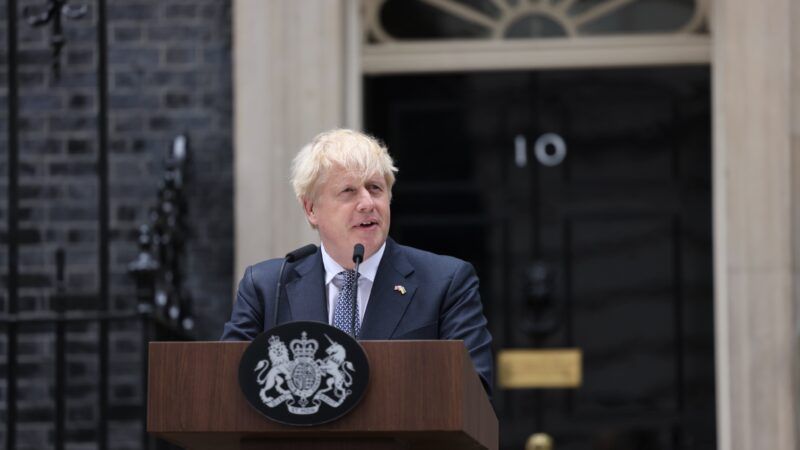Boris Johnson Leaves Behind a Bigger, Bloated State
As the Johnson premiership goes down in flames, perhaps the Conservative Party will finally rediscover its commitment to liberty.

After a truly surreal 36 hours, British politics has some clarity: The prime minister, Boris Johnson, will resign, thus triggering the third Conservative leadership contest in six years. His successor (due to be picked from a field of hopeful Tory parliamentarians which could easily stretch to a dozen people) is expected to take office this autumn. The race begins now.
For British libertarians, the end of the Johnson premiership is a bittersweet moment. For all his association with liberty-crushing lockdowns, many of us still remember when Johnson was a darling of the freedom-loving right. He used to be the politician who made his career rallying against the excesses of the nanny state while thumbing his nose at bores and bureaucrats alike.
It was this penchant for freedom and optimism that made Johnson such an effective campaigner for Brexit. Unlike the nativist grievance peddling from the likes of Nigel Farage, Johnson painted Brexit as a chance to build a more outward-looking and ambitious Britain. All we had to do first was "take back control"—and end the supremacy of European Union regulation. It was a theme that went on to power both his leadership and general election campaign of 2019.
But shortly after the newly-crowned prime minister broke the political deadlock around Brexit, there came a new crisis: COVID-19. At first, Johnson's much-heralded libertarian instincts held up nicely. In one of his early press conferences about the pandemic (in which he encouraged a nervous public to minimize social contact and keep physical distance), Johnson laughed off a question about calling in the police to enforce common sense. Within weeks, he had been persuaded by his advisers to order a full lockdown.
It was this heavy-handed approach that would go on to shape 18 months of British politics, as the country veered from punitive lockdowns (at one point opting for the most stringent measures in Europe) to equally invasive lockdown-lite measures like the "rule of six." As backbench libertarian members of Parliament raged, Johnson's acolytes sought to assure the public that these measures flew in the face of his political instincts—and would disappear as soon as possible. But many of us weren't convinced.
The truth is that, even as the pandemic faded, Johnson's newfound "big state" instincts did not. One of the first warning signs was when, after Johnson had been hospitalized with COVID-19, he announced an expansive anti-obesity agenda—promising to ban multibuy deals on unhealthy food; end television advertising of sweets and crisps; and even make calorie counts compulsory on all restaurant menus (a move that would have placed a disproportionate burden on small businesses).
Downing Street didn't just come after our diets. One of the government's flagship legislative proposals was the much-criticized Online Safety Bill: a sprawling manifesto on internet regulation that would see web hosts fined vast sums for failing to remove "legal but harmful" content (the exact meaning of which would be subject to the judgment of government ministers). Free speech advocates saw it for what it was: a censor's charter.
His supposed libertarianism didn't add up to much when it came to taxation and spending, either. Having used his leadership campaign to define himself against the austerity measures of previous Tory governments, Johnson spent his time on Downing Street going even further—driving up state spending in pursuit of lofty policy goals (including using taxpayer cash to protect the assets of millionaire pensioners by introducing a socialized cap on privately-provided elder care).
Under big-spending Boris, tax levels reached the highest level since WWII. A sneaky decision not to inflation-proof tax thresholds meant that 2 million people just got pushed into a higher tax bracket, even though their real-terms earnings have not necessarily increased. Businesses didn't fare much better either—just look at the recent decision to levy a short-notice "windfall tax" on the increased profits of energy firms (which comes on top of the planned hike in corporation tax).
Inevitably, this profligate attitude was going to bring trouble for a maverick like Johnson. And so it did last month when a mooted plan to ignore World Trade Organization rules in order to unfairly subsidize British steel (a move designed to appeal to Johnson's protectionist "Red Wall" voters) led to the resignation of Christopher Geidt, the prime minister's ethics adviser. Although, of course, none of those scandals came close to Partygate—the lockdown-breaking spree that hastened Johnson's downfall.
For all his promise, the truth is that Johnson—the supposed savior of the Tory right—will end up leaving behind a Britain considerably less free than the one he inherited. Many will continue to praise him for delivering Brexit, but this misses the point. While the U.K. may be out of the E.U. legal orbit, we've done almost nothing to take advantage of it, retaining the vast majority of the regulations that Johnson used to rail against so persuasively.
If there's one positive, it's that—as the Johnson premiership goes down in flames—perhaps the Conservative Party will finally rediscover its commitment to liberty. There are already signs that at least one serious candidate (the current foreign secretary, Liz Truss) plans to run on a more libertarian-oriented platform in the upcoming contest. Others are likely to follow in the coming weeks.
If Conservative voters have paid attention during the Johnson premiership—rather than remaining blinded by party or Brexit loyalty—they will have observed the folly of "big state" conservatism. Let's hope this summer they vote in a way that reflects that.


Show Comments (65)